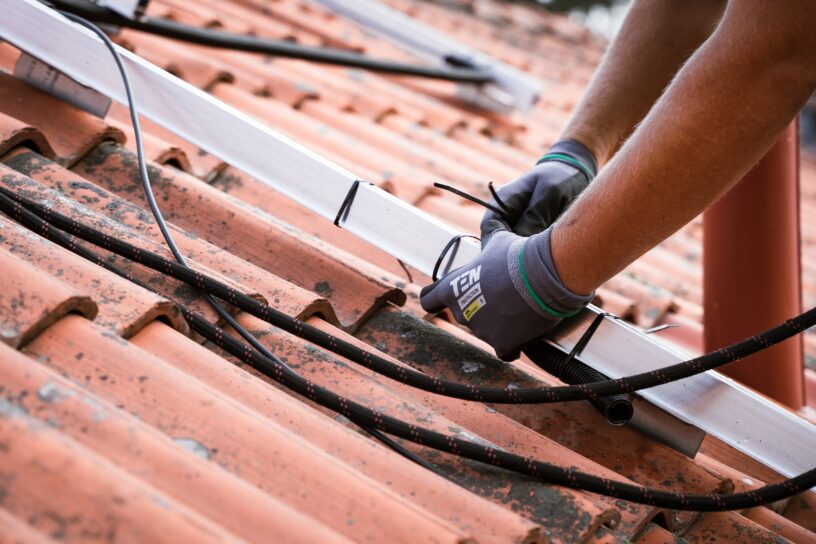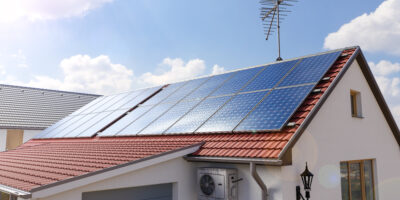Solar energy is a powerful renewable energy derived from the sun’s rays. This energy can be harnessed to power homes, businesses, and even cities. The importance of solar energy cannot be understated, as it provides a clean, sustainable source of electricity that does not contribute to climate change or harm the environment.
Harnessing the Sun’s Power
Harnessing solar power involves converting sunlight into electricity through photovoltaic (PV) technology. PV panels absorb sunlight and convert it into direct current (DC) electricity which can then be converted into alternating current (AC) by an inverter. This clean, reliable form of energy can then be used to power homes, businesses or fed back into the grid for others to use.
Breaking Down Barriers
While solar technology has become increasingly popular in recent years due to its environmental benefits and cost savings, but many barriers still prevent widespread adoption. One such barrier is access to quality products and equipment necessary for installation. That’s where solar energy products and equipment suppliers come in.
The Role of Solar Energy Products and Equipment Suppliers
Solar energy products and equipment suppliers play an essential role in powering the solar revolution by providing top-quality products and services needed for a successful installation. Their role ranges from providing high-quality photovoltaic panels to inverters, battery mounting systems, monitoring systems, and accessories like charge controllers. Their contribution helps remove barriers associated with access to renewable sources allowing more people across different regions worldwide to access renewable sources, thus contributing less carbon emissions while reducing reliance on traditional methods with finite resources.
Sourcing Quality Products and Equipment
Choosing a reliable supplier of solar products and equipment is important for those looking to switch to solar energy. A good supplier will offer a range of products at competitive prices, have a wealth of knowledge and expertise in installation and maintenance, and excellent customer service.
By using quality products from reputable suppliers, you can be confident that your solar energy system will be efficient, long-lasting, and provide excellent returns on investment. In the following sections, we delve deeper into different types of solar energy products available today, their functionalities, and some top suppliers who provide them.
The Lowdown on Solar Panels
Solar panels are now a common sight on rooftops across the globe, helping homeowners and businesses to harness the power of the sun. But with so many different types of solar panels available today, choosing one can be an overwhelming task. In this section, we’ll explore some of the main types of solar panels that you may come across when shopping for solar energy products.
Different Types of Solar Panels
There are three main types of solar panels: monocrystalline, polycrystalline, and thin film. Monocrystalline cells are made from a single crystal and are more efficient than other types of cells. They also have a sleeker appearance and take up less space.
Polycrystalline cells are made up of multiple crystals and are less expensive than monocrystalline cells but also less efficient. Thin-film solar panels use a much thinner layer of photovoltaic material than traditional solar panels, making them lightweight and flexible.
When considering which type of solar panel to choose for your home or business, it’s essential to consider your budget and energy needs. Monocrystalline cells may be more efficient but more expensive than other types.
Factors to Consider When Choosing a Solar Panel Supplier
Choosing a reputable supplier is key when it comes to buying solar panels. Here are some factors to consider:
– Experience: Look for suppliers with experience in the industry who can provide references or testimonials from satisfied customers. – Quality: Ensure the supplier uses quality materials and components in their products.
– Warranty: Check that the supplier offers a product warranty so that you’re covered if anything goes wrong. – Installation services: Consider whether the supplier offers installation services or if they work with trusted partners to install their products.
Popular Brands and Their Unique Features
Here are some of the most popular solar panel brands and their standout features: – SunPower: Known for being highly efficient, even in low light conditions, SunPower solar panels also have a sleek black design that blends in seamlessly with rooftops. – LG: LG’s solar panels come with a 25-year warranty and are known for being durable and reliable.
They also come in a variety of sizes to fit different energy needs. – Canadian Solar: A more affordable option, Canadian Solar panels offer good value for money without sacrificing quality.
They’re also known for their high-efficiency levels. When choosing a brand, it’s important to consider the product’s features and the availability of customer support and after-sales services.
Inverters: The Brain of Your Solar Energy System
When it comes to solar energy systems, the inverter is the most important component after the solar panels themselves. This device serves as the brain of your system, converting DC power generated by your solar panels into AC power that can be used to power your home or business.
Without an inverter, your solar panels would be useless! There are two main types of inverters: string inverters and microinverters.
String inverters are more common and less expensive, but they work best when all of the panels they service are functioning at their maximum output. If one panel is shaded or underperforming for any reason, it can reduce the efficiency of all connected panels.
Microinverters, on the other hand, are attached directly to each panel and work independently. This means that even if one panel is underperforming or shaded, it won’t affect the rest of your system’s output.
One popular brand of inverter is SMA Solar Technology. This company produces both string and microinverters for residential and commercial systems alike.
They also offer a line of hybrid inverters that allow you to store excess energy from your system in batteries for later use. Another top supplier is Enphase Energy, which specializes in microinverters that allow you to monitor each panel’s performance from a centralized location.
If you’re looking for an alternative to traditional central or microinverters, you might consider power optimizers like those produced by SolarEdge Technologies. These devices attach to each panel as microinverters do but also allow for better monitoring and optimization without constantly adjusting module strings.
When choosing an inverter supplier, there are a few key factors to consider beyond just price. Look for a company with a solid reputation for reliability and customer support since this component is critical to your entire solar energy system’s functionality.
You’ll also want to consider the inverter’s size and capacity to ensure compatibility with your overall system design. Overall, investing in a high-quality inverter maximizes your solar energy output and savings over time.
Batteries: The backbone of your solar energy system
When powering a solar energy system, batteries are perhaps the most crucial component. They store the energy generated by the solar panels during the day, allowing you to use it at night or when your panels are not producing electricity.
But choosing the right type of battery for your specific needs can be daunting. In this section, we’ll look at why batteries are so important for solar energy systems and explore different battery types and tn the market.
The importance of batteries in a solar energy system
Without batteries, a solar energy system would only be useful during daylight hours when there’s enough sunlight to generate electricity. By storing excess power produced during peak times and releasing it when needed, batteries allow us to use our renewable energy sources better and reduce reliance on traditional power grids.
Another benefit of using batteries in conjunction with your solar panel array is that they can help protect against power fluctuations or outages caused by weather events or other unexpected circumstances. If there’s an interruption in grid power, a well-designed battery backup system can seamlessly kick in and ensure that you always have access to electricity.
Types of batteries available for different applications
Several different types of batteries are used for storing solar-generated electricity, each with its own benefits and drawbacks: – Lead-Acid Batteries: These are one of the oldest battery technologies available and remain popular due to their affordability. However, they require regular maintenance, including periodic fluid checks and replacements.
– Lithium-Ion Batteries: This newer technology is widely used due to their high-efficiency rate (97%) compared to lead-acid (80%). They also require very little maintenance.
– Saltwater Batteries – The latest technology uses saltwater electrolytes instead of harmful chemicals in traditional lithium-ion models, making them eco-friendly and non-toxic. – Nickel-Iron Batteries: Another old technology that has resurfaced recently due to its longevity and resistance to deep discharges.
Each battery type works better for different applications. When choosing the right battery, it’s important to consider capacity, lifespan, cost, and maintenance requirements.
Top battery suppliers and their product offerings
Here are some of the top solar energy battery suppliers and their standout products:
- Tesla Powerwall: This is one of the most popular solar batteries on the market due to its sleek design and high storage capacity (up to 14kWh).
- LG Chem RESU: Another popular option with impressive storage capacity (up to 16kWh), LG Chem RESU batteries are designed for residential and commercial applications.
- SonnenBatterie Eco: This German-made product is known for its superior reliability, with a lifespan of over 10 years. It includes backup power support, off-grid capabilities, and remote monitoring.
- SimpliPhi Power PHI 3.5 kWh Battery: With a compact design that’s easy to install in tight spaces, SimpliPhi Power batteries are ideal for small-scale residential solar systems.
- Aquion Energy Aspen Battery: The only saltwater-based battery on our list is the environmentally friendly Aquion Energy Aspen Battery. It boasts an impressive lifespan of up to 20 years.
Overall, selecting a solar energy battery requires careful consideration based on your specific needs. It’s important to choose a reputable supplier who can offer guidance throughout the installation process and provide ongoing support when necessary.
The Crucial Role of Mounting Systems in a Solar Panel Installation
When installing solar panels, the mounting system is just as important as the panels themselves. Without a proper mounting system, even the most high-quality solar panel won’t generate the energy it can. A good mounting system should keep the panels in place while allowing easy installation and maintenance.
Different Types of Mounting Systems Available
Several types of mounting systems are available for solar panel installations, including roof-mounted systems, ground-mounted systems, and pole-mounted systems. Roof-mounted systems are the most common mounting system used for residential solar panel installations.
They are installed directly onto the roof using brackets or frames attached to the rafters or trusses. This type of mounting system is ideal for homeowners who don’t have a lot of extra space on their property.
Ground-mounted systems are installed directly onto the ground using poles that support a frame structure. This type of mounting system is ideal for homeowners with larger properties who want to install more solar panels than their roofs can accommodate.
Pole-mounted systems are similar to ground-mounted systems but are installed on poles rather than directly on the ground. This type of mounting system is often used in commercial or industrial applications where large solar panels must be installed in one location.
Top Suppliers and Their Product Offerings
When choosing a supplier for your solar panel mounting system, many options are available. Some top suppliers include Unirac, IronRidge, and Quick Mount PV. Unirac offers several types of roof-mounting systems designed for residential and commercial applications.
They use high-quality materials like aluminum and stainless steel to ensure durability and longevity. IronRidge specializes in ground-mounting systems that can be customized to fit any site or terrain.
Their mounting systems are designed to be easy to install and maintain, with features like snap-in brackets that simplify the installation process. Quick Mount PV offers a range of roof-mounting systems compatible with various roofing materials, including asphalt shingles, tile, and metal roofs.
They also offer a 25-year product warranty to give customers peace of mind. The mounting system is an essential component of any solar panel installation.
With so many mounting systems and suppliers available, choosing the right one for your specific needs is essential. By researching and selecting a high-quality supplier like Unirac, IronRidge, or Quick Mount PV, you can ensure that your solar panel system will generate maximum energy over its lifetime.
Monitoring Systems
The Importance of Monitoring Systems for Optimal Performance
When it comes to solar energy systems, monitoring is crucial to ensure optimal performance. Without monitoring, it becomes impossible to detect whether or not the system is functioning properly. Monitoring systems provide important data on the system’s output and help identify and address any issues that may arise.
Monitoring systems also maximize energy efficiency by identifying areas where improvements can be made. They can help track energy usage patterns and suggest changes that will lead to greater savings on your utility bill.
Types of Monitoring Systems Available
Various monitoring systems are available for solar energy systems, each with its features. The most basic type of system provides basic data, such as the amount of energy produced and consumed by the system.
More advanced monitoring systems offer real-time data on the performance of individual panels, allowing you to identify any issues early on. Some even come equipped with predictive analytics capabilities to forecast performance based on weather patterns and other factors.
Top Suppliers and Their Product Offerings
When choosing a supplier for your solar energy monitoring needs, there are a few key players in the market. One popular option is SolarEdge, which offers both panel-level and string-level monitoring solutions.
Enphase Energy is another top supplier, offering microinverter technology for panel-level monitoring and advanced analytics capabilities. Meanwhile, Fronius offers a comprehensive suite of solutions, including smart meters and inverters with built-in monitoring capabilities.
Other notable suppliers include SMA Solar Technology, Tigo Energy, and Sensata Technologies. Each supplier has its unique offerings when it comes to solar energy monitoring solutions.
Conclusion: Choose Your System Wisely
Investing in a reliable monitoring system is critical for the optimal performance of your solar energy system. With various solutions available on the market, it is important to carefully consider your needs and choose a supplier that can provide the right solution. Doing so will ensure your solar energy system is functioning at peak performance and maximize your utility bill savings.
Accessories: The Little Things That Make a Big Difference
When setting up your solar energy system, it’s essential not to overlook the smaller details, like accessories. While these may seem insignificant compared to the larger components like solar panels and inverters, they play an important role in ensuring your system operates efficiently and reliably.
The charge controller is one of the most essential accessories for any solar energy system. This device regulates the charge going into your batteries, ensuring they don’t become overcharged or damaged.
Popular brands include Morningstar and Outback Power, which offer a range of high-quality charge controllers suitable for different applications. Another accessory that is often overlooked but equally essential is the combiner box.
This device allows multiple strings of solar panels to be combined into a single output, simplifying installation and reducing overall system costs. Top suppliers of combiner boxes include MidNite Solar and Schneider Electric.
Surge protectors are also an important accessory for any solar energy system. These devices protect against power spikes and voltage surges that damage sensitive electronic equipment like inverters and charge controllers.
Some popular surge protector brands include SolarEdge, Tigo Energy, and Fronius. Other useful accessories for a solar energy system may include monitoring systems that allow you to track performance data in real-time; fuses that protect against short circuits; AC disconnects for safety during maintenance; grounding equipment to prevent electrical shocks; and cabling and connectors for wiring everything together.
Top Accessory Suppliers: Who Should You Choose?
When choosing accessory suppliers for your solar energy system, there are many factors to consider beyond just price. Quality, reliability, customer service, warranty terms, compatibility with other components in your system – all these factors should be considered when making your decision. One top supplier worth considering is Schneider Electric.
This global company offers a wide range of accessories for solar energy systems, including combiner boxes, charge controllers, monitoring devices, and more. Their products are known for their high quality and reliability, and they offer excellent customer service and technical support.
Another top player in the solar accessory market is MidNite Solar. This American company specializes in designing and manufacturing innovative products for the renewable energy industry, focusing on combiner boxes.
Professionals in the industry highly regard their products for their durability, flexibility, and ease of use. For those who prioritize brand recognition and reputation above all else, Fronius is an excellent choice.
This Austrian company has been in business since 1945 and has a long history of innovation in the electronics industry. They offer a range of accessories for solar energy systems, including surge protectors and monitoring devices.
Ultimately, the best accessory supplier for your solar energy system will depend on your specific needs and priorities. Take the time to research different brands and read reviews from other customers before making your decision – it could make all the difference in ensuring that your system functions flawlessly over the long term.
Conclusion:
The Importance of Choosing the Right Solar Energy Products and Equipment Suppliers
Investing in solar energy is not only a wise decision for your wallet but also for the environment. However, it is equally essential to ensure that you choose the right products and suppliers to maximize the benefits of your investment. When choosing a solar panel supplier, consider efficiency, durability, and warranty factors.
Look for suppliers who offer reliable products tested under various environmental conditions. Popular brands like LG, SunPower, and Canadian Solar offer high-quality panels with superior performance ratings.
Similarly, inverters play a crucial role in ensuring that energy harvested by solar panels is effectively converted into usable electricity for your home or business. Choose a supplier that offers inverters with high-efficiency ratings that match the specifications of your solar panel system.
Brands like SMA and Enphase Energy are popular for residential and commercial applications. Batteries are essential components of an off-grid or hybrid solar system since they store excess energy harvested during peak hours for use at night or during cloudy weather.
When selecting batteries, consider factors such as capacity, voltage requirements, cycle life (number of cycles it can undergo before losing capacity), and safety features like overcharge protection. Mounting systems securely hold solar panels on rooftops or ground mounts while optimizing their positioning for maximum sunlight exposure.
A good mounting system should be durable enough to withstand harsh weather conditions and easy to install or maintain. Monitoring systems allow you to track your system’s performance data, such as energy production levels, battery charge status, and other parameters, remotely via phone apps or web portals from anywhere in the world with internet access.
Investing in quality solar products and equipment from reputable suppliers will ensure maximum returns on your investment while reducing carbon emissions simultaneously. So, choose wisely and make the switch to solar energy today!



